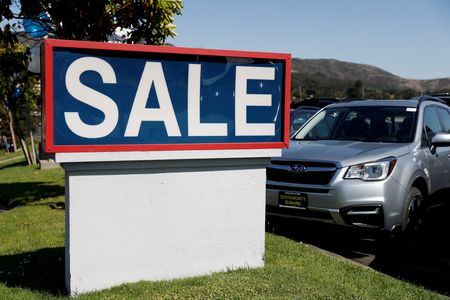 1
1 1
1
By David Shepardson
WASHINGTON (Reuters) -A group of 17 Democratic U.S. lawmakers on Wednesday urged the Federal Trade Commission to finalize new consumer protections for car buyers despite objections from auto dealers who argue the rules would actually raise the cost of buying a car.
The FTC in June 2022 proposed banning fees and bait-and-switch advertising tactics and requiring dealers to make key disclosures to consumers, including providing a true “offering price” and making disclosures about optional add-on fees. The FTC said the rules “would save consumers time and money and help ensure a level playing field for honest dealers.”
Senators Ed Markey, Ron Wyden, Cory Booker, Brian Schatz, Elizabeth Warren and Richard Blumenthal and Representative Pramila Jayapal, among others, in a previously unreported letter seen by Reuters, called on the FTC to “adopt strong regulatory protections for car buyers.” They argued that “unfair and deceptive practices involving motor vehicle dealers have widespread consequences.”
The lawmakers said the FTC should require dealers to provide a legally enforceable “Offering Price” “that includes all pre-installed and mandatory add-on products” and finalize regulations prohibiting specific misrepresentations, among other reforms.
The FTC wants to ban fees for add-on products and services that provide no consumer benefits like “nitrogen-filled” tires that contain no more nitrogen than normal air.
“Dealers also pack vehicle sales with mandatory and price-inflated add-ons, increasing the cost and creating further confusion and uncertainty about a vehicle’s ultimate price,” the lawmakers wrote.
The National Automobile Dealers Association said the FTC proposal would “upend the sales process for tens of millions of consumers annually and thousands of small businesses.” The trade group called it “premature, legally deficient, factually inaccurate, and exceedingly confusing for consumers and dealers.”
The group commissioned a study from the Center for Automotive Research that said compliance costs could be significant.
The FTC estimated the proposed rule would generate $29.7 billion in net consumer benefits over a 10-year period while CAR’s analysis found it would cost consumers $38.1 billion over the period and in fact lead to lengthier sales transactions.
The Alliance for Automotive Innovation, representing General Motors, Toyota Motor, Volkswagen and other major automakers, raised concerns about the FTC plan and warned that “excessive regulation and micromanagement of the sales experience can do more harm than good for both consumers and the industry.”
In September, six Republican senators said the FTC proposal “would confuse customers, lengthen the transaction time to purchase a vehicle, limit consumer choice, increase paperwork, and mandate burdensome new recordkeeping requirements.”
(Reporting by David ShepardsonEditing by Chris Reese, David Gregorio and Leslie Adler)